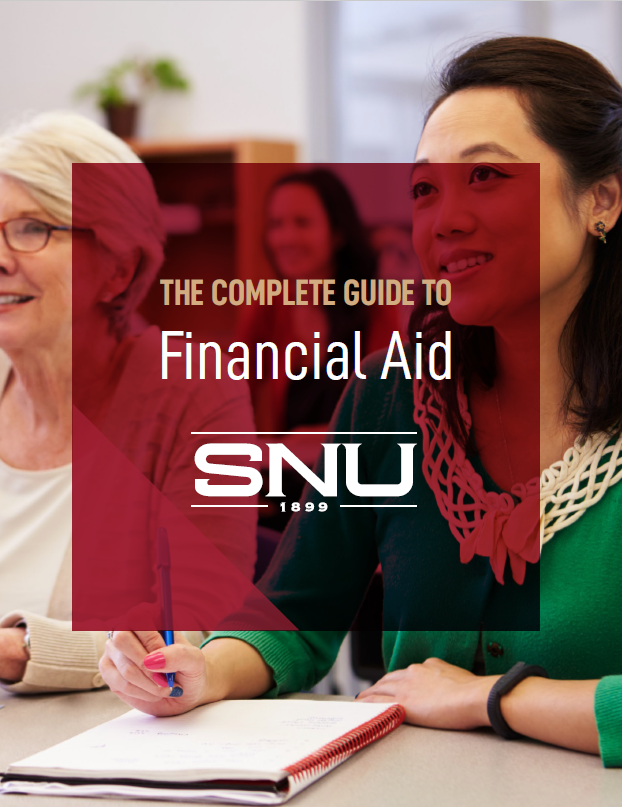-
Programs
Not Sure Where to Start?
- Associate Programs & Certificates
- General Studies
- Information Systems & Technology
- Physical Therapist Assistant
- Professional Services & Certificates
- View All
- Undergraduate Programs
- Business Administration
- Criminal Justice
- Cybersecurity
- Education
- Family Studies and Gerontology
- Healthcare Administration
- Organizational Leadership
- Accelerated General Education
- View All
- Resources
- Tuition & Aid
- Military
Physical Therapist Assistant (A.S.)
Prepares students to sit for the NPTE and become a fully licensed Physical Therapist Assistant.
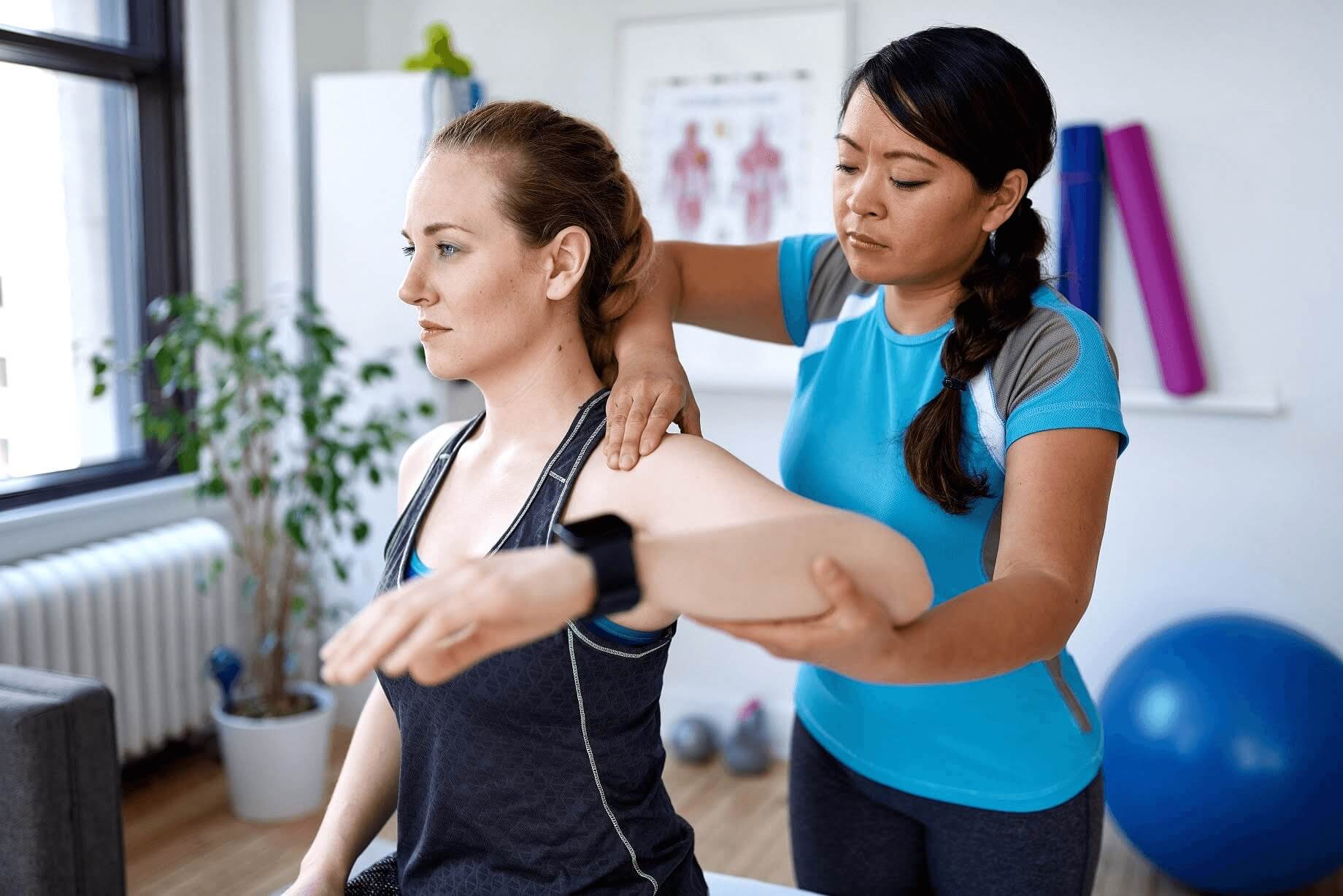
Program Overview
You can complete SNU’s PTA program in 23 months! Our format offers classes at night because we recognize the diverse intersections of students. This format gives you the flexibility to continue working or care for your other daytime responsibilities. SNU provides extensive support including advising and enrollment assistance, free tutoring, and a broad network of local clinicians who also serve as associate faculty members and guest lecturers.
PTA Program Mission Statement
The Southern Nazarene University Physical Therapist Assistant Program prepares competent, ethical, and self-directed healthcare practitioners who model professional core values. The program is committed to excellence in education and delivers a contemporary curriculum within a Christ-centered community. Graduates will be able to meet the diverse needs of the community by providing high-quality patient care as a physical therapist assistant working under the direction and supervision of a physical therapist.
PTA Program Goals
-
Graduates will be prepared to work as entry-level physical therapist assistants who model professional core values and integrity while serving their community under the direction and supervision of a licensed physical therapist.
2. Students and graduates will demonstrate effective interprofessional and intraprofessional collaborative practices as a part of the healthcare team.
3. The program will provide students with excellent, contemporary, and diverse educational opportunities delivered in a Christ-centered community.
4. Program faculty will engage in activities to support diversity, equity, and inclusion.
Effective October 25, 2022, Southern Nazarene University has been granted Candidate for Accreditation status by the Commission on Accreditation in Physical Therapy Education (CAPTE), 3030 Potomac Ave., Suite 100, Alexandria, Virginia 22305-3085; phone: 703-706-3245; email: accreditation@apta.org). If needing to contact the program/institution directly, please call Loren McElroy, Program Director, at 405.491.6630 or email Lmartin@snu.edu.
Candidate for Accreditation is an accreditation status of affiliation with the Commission on Accreditation in Physical Therapy Education that indicates the program may matriculate students in technical/professional courses. Achievement of Candidate for Accreditation status does not assure that the program will be granted Initial Accreditation.
Candidacy is considered to be an accredited status, as such the credits and degree earned from a program with Candidacy status are considered, by CAPTE, to be from an accredited program. Therefore, students in the charter (first) class should be eligible to take the licensure exam even if CAPTE withholds accreditation at the end of the candidacy period. That said, it is up to each state licensing agency, not CAPTE, to determine who is eligible for licensure. Information on licensing requirements should be directed to the Federation of State Boards of Physical Therapy (FSBPT; www.fsbpt.org) or specific state boards (a list of state boards and contact information is available on FSBPT's website.
Request More Info
Fill out the form below and an enrollment counselor will reach out!
How it Works
Earning a degree while working full time or raising a family has never been more possible. Here’s why adult students are thriving and reaching their goals at SNU:
- Classes take place one to two nights a week.
- Students focus on one class at a time to ensure true mastery and prevent burnout.
- Students study alongside other adults in similar stages of life.
- Instructors with vast amounts of clinical experience guide students through courses.
- Textbooks are delivered directly to your door at the beginning of each class.
- A dedicated student success advisor guides students through the duration of your studies.
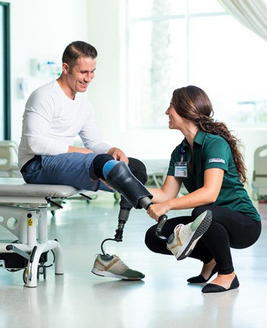
Courses
This program is designed to be completed in 23 months and prepare students to become a physical therapist assistant. Students in this program take one class at a time so they can master one subject before moving on to the next.
View the course of study by semester.
View the 2023 PTA Student Financial Fact Sheet.
View the Clinical Education Handbook and the PTA Program Policies and Procedures Handbook for additional information.
This course introduces the history of the PTA Profession and common practice settings. Students will learn and perform fundamental physical therapy assessments, interventions, documentation, and procedures of patient care including transfer training, gait training, and fitting assistive devices. The scope of practice of the PTA and PT, HIPPA, and documentation will be emphasized. Delineation of professional roles and responsibility in physical therapy, development of a team approach to healthcare delivery, and the psychosocial and interpersonal skills needed to function as a healthcare team are presented. Students will have laboratory time to apply, practice, and demonstrate the technical skills taught.
This course will explore human motion specific to the musculoskeletal system through the identification of anatomical structures and their relationship to function, normal and abnormal biomechanical principles of joint patterns, and gait. Emphasis will be on the study of musculoskeletal pathologies, the determination of appropriate physical therapy assessment, and a review of related anatomical structures. Laboratory time will be utilized to master skills and techniques including goniometry, manual muscle testing, joint play assessment, and joint mobilization.
This course will explore human motion specific to the musculoskeletal system through the identification of anatomical structures and their relationship to function, normal and abnormal biomechanical principles of joint patterns, and gait. Emphasis will be on the study of musculoskeletal pathologies, the determination of appropriate physical therapy assessment, and a review of related anatomical structures. Laboratory time will be utilized to master skills and techniques including goniometry, manual muscle testing, joint play assessment, and joint mobilization.
This course provides exposure to simulated patients and scenarios for the student to develop clinical problem solving, and practice skills related to semester 1 course content with instructor guidance. This course is designed to demonstrate clinical readiness and will focus on simulated patient assessment and treatment scenarios to prepare students for clinical education, in which they will perform specific assessment techniques and treatment interventions in simulated patient scenarios. In addition, this course includes a weekly online assignment consisting of a class discussion or reflection on related topics. By the end of the course, the student will appropriately epitomize the role and responsibilities of the physical therapist assistant in a variety of physical therapy settings.
This course is a study of how the human body functions and the physiological effects of disease. Building a clear, foundational understanding of normal physiology aids in illuminating how abnormal physiological function leads to human disease. Physiological response to exercise, etiology, signs and symptoms, red flags, diagnosis and prognosis, pharmacological intervention, and implications for physical therapy will be discussed. Case studies will be provided for critical thinking and application of theory to practice for the physical therapist assistant.
This course investigates the anatomy and physiology of the nervous system, with emphasis on the functional relationship between the nervous system and the presentation of pain in the musculoskeletal system. This course prepares the student for safe and effective application of a variety of rehabilitative agents and techniques for patient treatment. Procedures, mechanisms of action, theory, indications, precautions, and contraindications are discussed for the following: electrical stimulation, EMG, biofeedback, diathermy, aquatic therapy, laser, superficial heat, cryotherapy, traction, therapeutic ultrasound, therapeutic massage, mechanical compression, and soft tissue mobilization. The basic physics of electromagnetic radiation and electricity are presented along with skin assessment and wound care using electrotherapy.
This course is a study of general and specific exercises for conditions commonly treated in physical therapy. Principles will be discussed involving the theory and practical applications of specific therapeutic exercise as preventative treatment and for pathological conditions influencing strength, endurance, neuromuscular control, and flexibility of the human body. Emphasis is placed upon the body’s physiological response to exercise, design and application of exercise, the developmental sequence of exercise, types of exercise, and the use of exercise equipment.
This course provides exposure to simulated patients and scenarios for the student to demonstrate competent performance of physical therapy procedures and behaviors for the semester level. This course is designed to show clinical readiness by performing skills listed below through the use of simulated patient scenarios. In addition, a weekly online assignment of a group discussion board or reflection on selected topics, emphasizing principles and techniques of basic physical therapy interventions, with emphasis on assessment skills including: identifying red flags, performing joint mobilizations, identifying fundamental physical therapy interventions, and demonstrating values based and professional behaviors. This course will also include several guest lectures, in which the students will reflect upon the information using research. The student will appropriately epitomize the role and responsibilities of the PTA in all physical therapy settings. This course is intended to strengthen clinical problem-solving and provide an opportunity for students to practice skills with instructor guidance and feedback through patient scenarios. Laboratory practice with emphasis on positioning, patient safety, and manual skills. The course included a comprehensive written examination.
This course is a study of physical therapy ethics, physical therapist assistant roles and responsibilities, and diversity. Delineation of professional roles in physical therapy and the health care team, as well as psychosocial and interpersonal skills needed to function as a health care provider and team member will be discussed. Principles and ethics of patient care, medical documentation, and HIPPA are covered. Activities associated with preparing students for future clinical education will be included.
This course provides the student with experiences to apply, integrate, and perform learned clinical skills on patients under continuous supervision of a licensed Physical Therapist in a physical therapy clinical environment. Skills, knowledge, and attitudes learned in all first-year Physical Therapist Assistant (PTA) courses will be applied to direct patient care in selected clinical settings over a full-time five-week period. Emphasis is placed on the clinical application and integration of the knowledge and skills learned during the first year of the PTA program, with the objective of students providing quality care with uncomplicated to moderately complex patients, and a moderate degree of supervision and guidance that will vary with the complexity of the patient or the environment. In addition, a weekly group discussion of selected topics, an individual weekly journal, and an in-service. This course is graded on a pass/fail basis.
Treatment of pediatric, pelvic health, and geriatric populations will be covered in this course. Theory and clinical application of normal and abnormal physical and cognitive development in the aging process as well as concepts of human growth and development will be covered in this course. Dysfunctions, interventions, common physical therapy treatments, and treatment progression will be the emphasis of content. Cultural diversity of older and younger populations and psychosocial impacts of aging will be discussed through a global perspective.
This course provides introduction to physical therapy interventions used in the management and prevention of cardiopulmonary conditions. Students will apply knowledge from this course and prior courses to both inpatient and outpatient care settings. Course content will include pulmonary hygiene, breathing techniques, cardiac rehabilitation, and principles of aerobic exercise. Information will be presented in lecture and laboratory settings.
This course provides information necessary for the physical therapist assistant to safely and competently treat patients with neurological diagnoses. This course will present the neuroanatomy of the CNS and PNS as it relates to physical therapy treatment, motor control, and motor learning. Neurological dysfunctions, neurological assessments, and the impact of neurological conditions on culturally relevant topics, such as gender, sexuality, communication, and socioeconomic factors will be explored.
This course is a continuation of Neuroscience I with emphasis on the application of exercise techniques, assessment, and the treatment of long-term disabilities and neurological conditions. This course will introduce common interventions and progressions used in neurological settings. The information, discussion, and treatment considerations for neurologically-based and other debilitating conditions will be applied in lab scenarios, in which the students will monitor the effectiveness of the exercise program.
This course focuses on the utilization of advanced physical therapy assessments and interventions. Topics covered include prosthetics and orthotic devices, rehabilitation techniques for amputations, wound care, and work hardening. Expected administration functions and activities of the physical therapist assistant will also be included.
This course provides the student with experiences to apply, integrate, and perform learned clinical skills on patients under the supervision of a licensed Physical Therapist in a physical therapy clinical environment. Skills, knowledge and attitudes learned in semesters 1, 2, and 3 Physical Therapist Assistant (PTA) courses will be applied to direct patient care in selected clinical settings over a full-time five week period. Emphasis is placed on the clinical application and integration of the knowledge and skills learned during semesters 1, 2, and 3 of the Physical Therapist Assistant (PTA) program, with the objective of students providing quality care with uncomplicated to complex patients, and a degree of supervision and guidance that will vary with the complexity of the patient or the environment. This course is graded on a pass/fail basis.
This course provides the student with experiences to apply, integrate, and perform learned clinical skills on patients under minimal to no supervision of a licensed Physical Therapist in a physical therapy clinical environment. Skills, knowledge, and attitudes learned in all Physical Therapist Assistant (PTA) courses will be applied to direct patient care in selected clinical settings over a full-time eight-week period. Emphasis is placed on the clinical application and integration of the knowledge and skills learned during the entire PTA program, with the objective of students providing quality care with uncomplicated to highly complex patients, and minimal to no degree of supervision and guidance that will vary with the complexity of the patient or the environment. In addition, a weekly group discussion of selected topics, an individual weekly journal, and an in-service are required. This course is graded on a pass/fail basis.
Upcoming Start Date
Meet our SNU Faculty
Dr. Loren McElroy, DPT, PT
Program Director
Loren is the Program Director for the Physical Therapist Assistant program. She graduated from SNU with a Bachelor of Science in Kinesiology in 2011. She earned her Doctor of Physical Therapy degree from Northwestern University (Chicago, IL) in 2014. She returned to SNU in 2016 as a full-time professor.
Since then, Loren has continued to work in outpatient clinics, rural hospitals, and her own private practice at Andiamo Physical Therapy, PLLC.
Read LessDr. Leah Spurlock, PT, DPT
Clinical Education Coordinator
B.S., 2017, Southwestern Oklahoma State University
DPT, 2020, The University of Oklahoma Health Sciences Center
Dr. Leah Spurlock has served at SNU since January of 2023 in the Physical Therapist Assistant program. She brings real-world experience to this program as a currently practicing physical therapist, specifically in the world of pediatrics. Through her time as a practicing clinician, she works with children of all ages and abilities.
Admission Steps
All students are encouraged to apply to SNU’s Physical Therapist Assistant (PTA) program. We review each applicant in our comprehensive, holistic admissions process. Admission into Southern Nazarene University’s PTA program is competitive. Maximum cohort size at this time is planned for 28 students. The required GPA for admission into the program is a minimum GPA of 2.0 in prerequisite courses with a grade of “C” or higher in prerequisite coursework. A cumulative GPA of 3.0 or higher is considered competitive.
Please read the PTA Admissions Packet carefully for full instructions and details. The following criteria must be met for admission to SNU’s Physical Therapist Assistant program. Meeting these requirements does not guarantee acceptance into the program.
Step 1: Acceptance to SNU
All applicants must first apply and be admitted to Southern Nazarene University. This can be completed through the website at degrees.snu.edu/apply.
Step 2: Complete Prerequisite Coursework**
All prerequisite coursework must be completed prior to beginning the PTA program. A student may be currently enrolled in a prerequisite course at time of application; however, they must show proof of completing the course prior to starting courses in the PTA program with a grade of “C” or better. All prerequisite courses must have been completed within the last 7 years. A student may only take a course 2 times to be counted toward the prerequisite requirements. An average of the grades will be calculated for the admission points system.
- Composition I (3 credit hours)
- Composition II (3 credit hours)
- General Psychology (3 credit hours)
- Survey of Anatomy and Physiology (3 credit hours)
Step 3: Send transcripts to SNU.
Electronic transcripts can be sent directly to pgsadmissions@snu.edu. You may also request documents to be mailed directly to: SNU PGS Admissions Attn: Transcripts 6729 NW 39th Expressway Bethany, OK 73008.
Step 4: Sign the background check agreement form.
This form can be found in the PTA Admissions Packet and should be emailed to pgsadmissions@snu.edu
Step 5: Two letters of recommendation.
The recommenders should not send a written letter of recommendation to SNU. They should use this link to submit a recommendation online. One recommendation should be from an employer or educator and one recommendation should be from a non-family member who can attest to the applicant’s professional and organizational skills (e.g. coach, organizational leader).
Step 6: Students will need to attend an in-person information session following conditional acceptance.
Locations
All PTA didactic coursework will be offered in-person at SNU’s main campus in Bethany, OK. Clinical placements will be offered across the United States; it is not guaranteed that a student will receive clinical placement in their state of residence. Students will be responsible for their own transportation and housing while on clinical rotations.
Bethany Campus
6729 NW 39th Expressway,
Bethany, Oklahoma 73008
Program Resources
Become an Instructor or Clinical Instructor
Physical Therapist Assistant students often remember their clinical rotations as the most important component of their education. It provides clarity in learning, deepens their understanding, and transitions them from theory to practice. Your contribution to their success cannot be overstated. Just as you remember people who were pivotal to your success in mastering your profession, so will these students benefit from your hard-earned expertise. Finally, precepting students allows you to informally interview them as a prelude to employment after graduation.
Thank you for your interest in the Southern Nazarene University Physical Therapist Assistant educational process. Your support is invaluable to us and critical to our students.
Please click here to share some information with us.
Complaint Policy
If a complaint falls outside of due process, complaints regarding the program should be addressed first to the Program Director, Dr. Loren McElroy at lmartin@snu.edu.
Unresolved complaints or complaints about the Program Director should be directed to the Vice President of Professional and Graduate Studies, Dr. Mark Winslow at mwinslow@snu.edu. No retaliation will occur by SNU or the PTA Program due to a complaint being filed.
All complaints will be documented, including the projected outcome, and kept on file at the program facility. All complaints will be stored in a locked filing cabinet located in the program director’s office.
Complaints regarding Accreditation of this program should be addressed to the Commission on Accreditation in Physical Therapy Education at accreditation@apta.org. This Commission is located at 3030 Potomac Ave., Suite 100 Alexandria, VA 22305-3085.
Getting started is easy
Request more information
Ready to apply? It takes 5 minutes!
Apply NowApplication Requirements
- Meet the admission requirements for your specific program
- Apply for an Undergraduate or Graduate Program
- Submit transcripts
- Be admitted, get advised, and enroll

Text With an Enrollment Counselor
Ready to make a difference in people’s lives? Text an enrollment counselor today to see how SNU’s grad counseling degree can get you one step closer to a rewarding career.



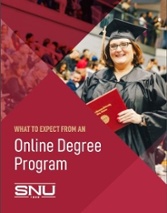
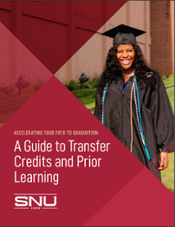

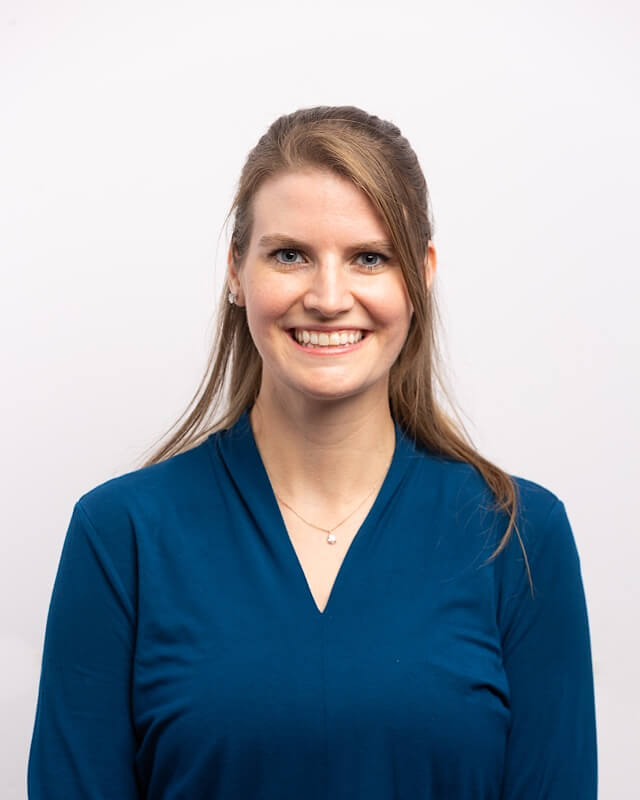
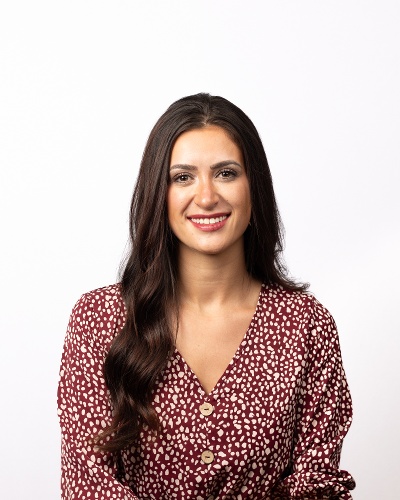
%20(1).jpg?width=250&height=166&name=anete-lusina--4Wi_ii6StY-unsplash%20(2)%20(1).jpg)

%20(1).jpg?width=250&height=130&name=GettyImages-1007078074%20(1)%20(1).jpg)
